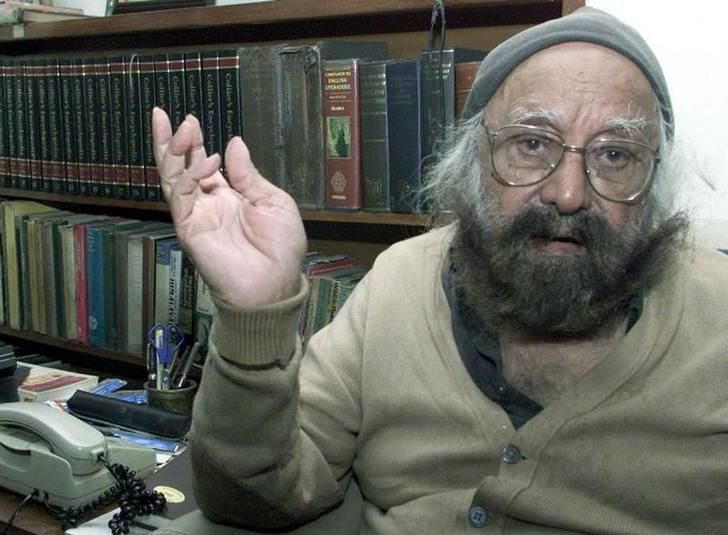Khushwant Singh, Famed Indian Novelist And Bon Vivant, Dies At 99

Renowned Indian novelist, journalist and former parliamentarian Khushwant Singh has died at the age of 99 after suffering from respiratory trouble. The NDTV broadcast network reported that Singh, who was perhaps best known for his classic 1956 novel of the Partition, “Train to Pakistan,” passed away peacefully at his home in Sujan Singh Park in New Delhi, where he lived most of his nearly century-long life. “He led a very full life. He had some breathing problems,” his son, journalist Rahul Singh told The Hindustan Times. "He was alert mentally till the very end.” The Times of India said Singh was best known “for his trenchant secularism, his humor, and an abiding love for poetry.”
Khushwant Singh was born in 1915 in the Muslim-majority village of Hadali, in what is now the Punjab province of Pakistan. He came from wealth and received his education at St. Stephen's College in Delhi, Government College in Lahore and subsequently at King's College and the Inner Temple in London. By his own reckoning, he was a mediocre student. His father was Sir Sobha Singh, a civil contractor and successful builder.
Singh eventually founded and/or co-edited such publications as Yojana, The Illustrated Weekly of India, the National Herald, as well as the Hindustan Times. He was especially well known for his popular weekly column entitled "With Malice towards One and All," which he wrote up until his passing. He also served in parliament as an MP from 1980-1986.
Khushwant Singh was revered for many other classic novels, including “I Shall Not Hear the Nightingale” and “Delhi”. In 2002, at the age of 87, he released his own candid autobiography, "Truth, Love and a Little Malice." Eight years later, at 95, he produced another novel, "The Sunset Club" which told the story of retirees.
Singh was mourned across the length and breadth of India. Prime Minister Manmohan Singh, who visited Khushwant’s home and family to extend his condolences, praised the novelist as a "gifted author, candid commentator and a dear friend." Narendra Modi, the leader of the conservative Bharatiya Janata Party (BJP), and the likely next Prime Minister, tweeted: “My condolences on the passing away of noted author & journalist Khushwant Singh. May his soul rest in peace.”
Khushwant Singh had a “long, prolific and illustrious literary career spanning several decades during which he wrote on subjects varying from politics to poetry to issues of social concern. He was particularly admired for being fearless in expressing his views in his writing and speech," stated Indian vice-president Mohammed Hamid Ansari in a tribute. Vikram Seth, himself a widely admired author, eulogized Singh as "a fearless writer; a man of great discipline yet full of zest for life; a great Indian who embodied our national values of affection, tolerance and understanding; and a true friend." Sir Mark Tully, a British journalist who worked in Delhi for many years, said of Khushwant: “He never minced his words and was a courageous person. I remember once having dinner with him when he showed up his tremendous knowledge about Urdu poetry. What a lovable man he was!”
But Khsuhwant Singh was no saint -- he was an avowed agnostic, a lover of Scotch and also wrote obsessively about sex. "He liked to call a spade a spade. He hated hypocrisy, fundamentalism, and was a gentle person," Khushwant’s son Rahul told NDTV.
Singh, a Sikh, had an odd relationship with former Indian Prime Minister Indira Gandhi. While many liberals and intelligentsia denounced the emergency order she introduced in 1975-1977, a period that included the imprisonment of many opposition leaders, Singh largely backed her, although he bristled at media censorship that Gandhi instituted. However, by 1984, in the wake of the military attack on the Golden Temple in Amritsar, the holiest shrine in Sikhism, Singh returned the Padma Bhushan (a prestigious civilian award conferred by the government) he had received in 1974 as a form of protest. Singh’s relationship with Indira was further strained by his close relationship with her estranged daughter-in-law Maneka Gandhi. (He later fell out with Maneka as well).
Still, by 2007, he accepted an even higher civilian award, the Padma Vibhushan. Khushwant Singh leaves behind his son, journalist Rahul, and daughter, Mala. His wife, Kawal Malik died in 2002.
© Copyright IBTimes 2024. All rights reserved.





















